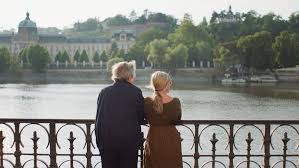When the forests were set on fire by the Nazis to scare the people, our colorblind young protagonist saw the forest burn green. This turn, of seeing green where there is red, this twist of faith may have contributed to the strength it took to shape a new life that remembers and heals. ‘Red Trees’ is the title of this evocative artsy film as memoir, ‘Red Trees.’ It is inventive too as an example of story telling – part documentary part re-enactment – builds drama in a manageable craftsman-like way. The sadness portrayed is interwoven with beauty and a love of design which seeps deep inside you safely because it is so beautiful. Gutsy too, it was financed by a Kickstarter campaign. If I had a crystal ball, I would predict a 2017 Oscar nomination for Red Trees in the foreign film category from either Brazil or England.
For Jews who did not flee Europe under the reign of Nazi Germany, who left after World War II, who emigrated to places outside the United States such as South America, this film is part of your origins story. The Post-War experience for those of us, no matter where our elders settled, who are now third generation post Apocalypse, whose grandparents or great grandparents perished in concentration camps is a must see and not to be missed. ‘Red Trees’ is distributed by the classy Cohen Media Group, opened in select theaters in select cities such as the Quad Cinemain Manhattan and Laemmle Theaters in Los Angeles.
Award-winning filmmaker and graphic designer, Marina Willer (Cartas da Mãe), creates an impressionistic visual essay. In this tour de force she traces her father’s family journey as one of only twelve Jewish families to survive the Nazi occupation of Prague during World War II. Not just any family. Ms. Willer’s grandparents made a fortune manufacturing citric acid a.k.a. Vitamin C, one of the least offensive food preservatives. Most remarkable is the level of curiosity in Willer’s grandchildren is a testament to a legacy of inquisitiveness and productivity.
Photographed by Academy Award® nominee César Charlone (City of God), the film travels from war-torn Eastern Europe to the color and light of South America with modern architecture as a constant thread symbolic of the rebuilding and restoring life to fullness. Told through the voice of Willer’s father Alfred (as narrated by Tim Pigott-Smith, Quantum of Solace), whose diary-like witness of childhood trauma. From idyllic youth to a world meltdown built on bureaucratic nightmares, near escapes, transportations and suicides viewers are delivered to a life where the banality of evil does not win out. The need to never give up, stay engaged, alert and hopeful about the world was key to survive, to design, to build a post-war life as an architect in Brazil. Alfred was unlike Stefan Zweig, another best selling author and European refugee expat, who unfortunately committed suicide. The work of psychologist Viktor Frankl about who survives trauma best comes to mind.
As the world struggles with the current refugee crisis in reverse, from the Third World to the First, RED TREES is a timely look at a family besieged by war who wants to tell the story of finding peace across an ocean. Once again we turn to the cinematic mirror to see what we can learn about the human condition. Some films stick with you more than others. This one is a welcomed presence.
Disclaimer Alert: Though viewing films can reveal insights about life it is not a substitute for therapy. If you or someone you know is suicidal, do not hesitate to reach out to a professional or trusted family member or friend to get needed help.


